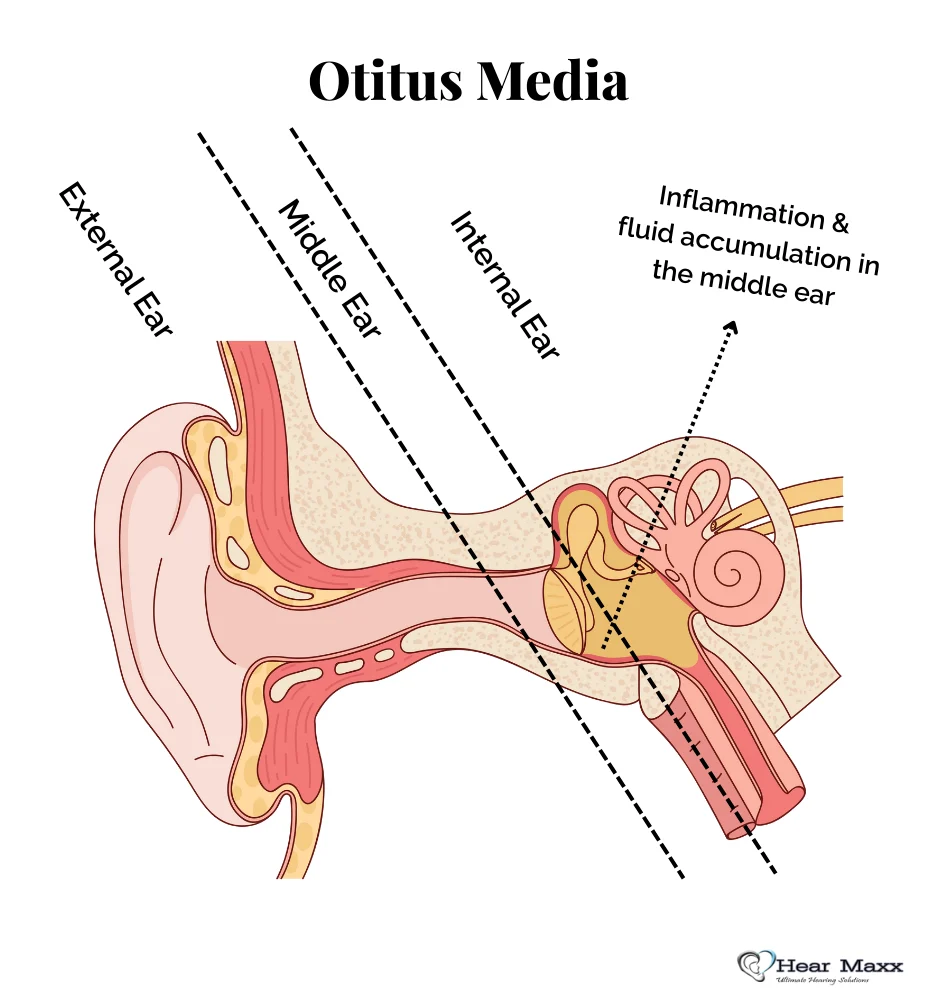Ear Infections & Conditions
At HearMaxx, under the expert guidance of our hearing expert Sheeraz Rahim, we are dedicated to providing comprehensive information and care for various ear-related issues. Understanding these conditions is the first step toward effective treatment and better hearing health.
Common Ear Infections, Symptoms & Treatment
An infection of the outer ear canal, often caused by water remaining in the ear after swimming, creating a moist environment that aids bacterial growth.
Symptoms:
- Itching in the ear canal
- Redness inside the ear
- Discomfort or pain, especially when touching the ear
- Drainage of clear, odorless fluid
Treatment: Cleaning the ear canal and applying prescribed ear drops to eliminate infection and reduce inflammation.
An infection of the middle ear, commonly occurring in children, often following a cold or respiratory infection.
Symptoms:
- Ear pain
- Fever
- Hearing difficulties
- Fluid drainage from the ear
Treatment: Observation for mild cases; antibiotics for persistent or severe infections. In recurrent cases, surgical intervention like tympanostomy tubes may be considered.
Accumulation of fluid in the middle ear without signs of infection, often following an ear infection.
Symptoms:
- Muffled hearing
- A feeling of fullness in the ear
- Balance problems
Treatment: Often resolves on its own; persistent cases may require ear tubes to drain fluid and restore hearing.

Other Ear Conditions
(Ruptured Eardrum)
Labyrinthitis
(Ruptured Eardrum)
A hole or tear in the eardrum, which can result from infections, trauma, or sudden pressure changes.
Symptoms:
- Sudden hearing loss
- Ear pain
- Tinnitus
- Fluid drainage
Treatment: Many perforations heal on their own; persistent cases may require surgical repair (tympanoplasty).
Labyrinthitis
Inflammation of the inner ear labyrinth, often resulting from viral infections.
Symptoms:
- Vertigo
- Hearing loss
- Tinnitus
- Nausea and imbalance
Treatment: Medications to control symptoms and, in some cases, corticosteroids to reduce inflammation.
Occurs when the Eustachian tube fails to open properly, leading to pressure differences and fluid accumulation.
Symptoms:
- Ear fullness
- Muffled hearing
- Tinnitus
- Dizziness
Treatment: Decongestants, antihistamines, nasal steroids, or surgical interventions like balloon dilation in chronic cases.
Hearing Loss Types
Conductive Hearing Loss
Occurs when sound waves are blocked from reaching the inner ear, often due to earwax build up, infections, or structural issues.
Causes:
- Ear infections
- Fluid in the middle ear
- Earwax blockage
- Otosclerosis
H
Sensorineural Hearing Loss
Results from damage to the inner ear or auditory nerve often permanent.
Causes:
- Aging
- Exposure to loud noise
- Infections
- Genetic factors
Treatment: Hearing aids or cochlear implants to improve hearing ability.
Prevention Tips
Keep ears dry and clean.
Avoid inserting objects into the ear canal.
Manage allergies and upper respiratory infections promptly.
Stay up-to-date with vaccinations.
Limit exposure to loud noises to prevent noise-induced hearing loss.

